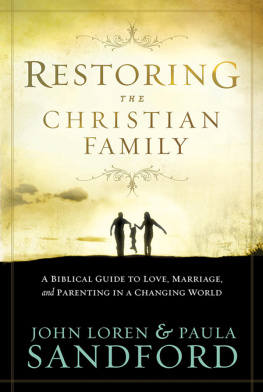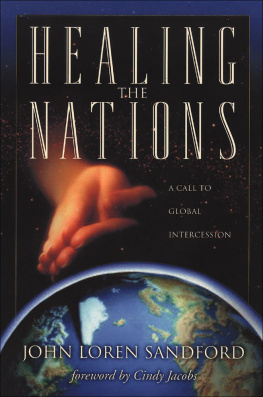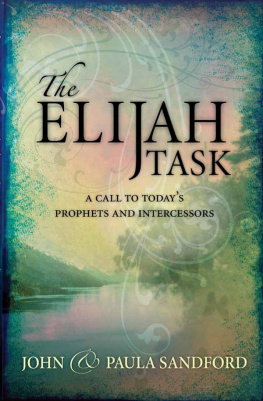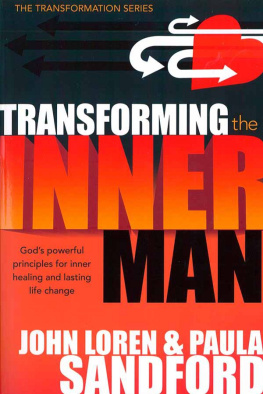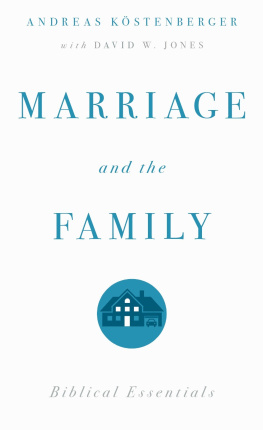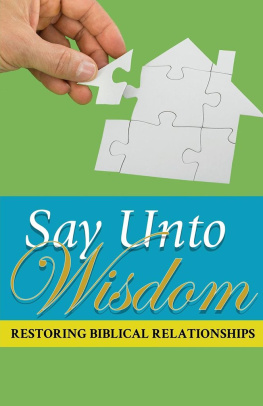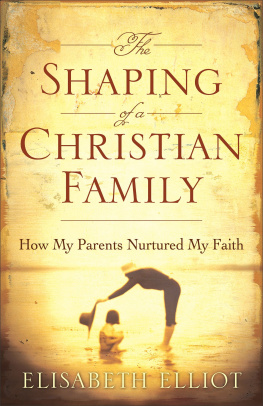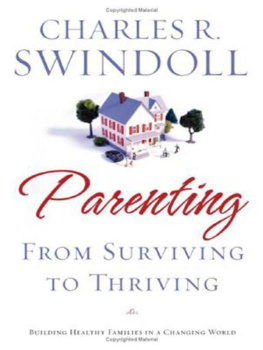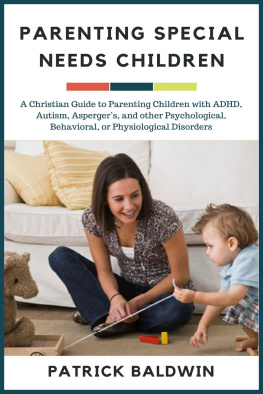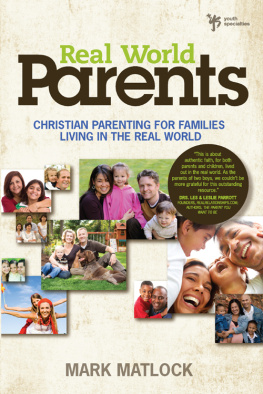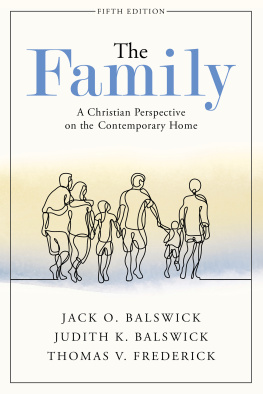
Moreover, I will give you a new heart and put a new spirit within you; and I will remove the heart of stone from your flesh and give you a heart of flesh.
EZEKIEL 36:26
W HAT WE HAVE SAID ABOUT ECOMING EMOTIONALLY crippled as we are formed may sound deterministic. Therefore, we want to make it clear that our parents actions do not determine our choices. They may tempt us to react, but ultimately, we make the choice. However, insofar as we all react sinfully, to one extent or another such results are inescapable. Perhaps the most cogent law in all the Bible is the fifth commandment: Honor your father and mother (which is the first commandment with a promise), that it may be well with you, and that you may live long on the earth (Eph. 6:23). The Ten Commandments and all the other laws in the Bible are not merely a collection of rules we ought to live up to but often dont. They are Gods description of the way reality works. If we drop a pencil, it falls because of gravity. If the pencil had a mind of its own and chose to hang in the air, that would have no effect whatsoever on its falling. By the same operation of law, we are recompensed in spiritual matters. If we lie, we must reap painful results. It makes no difference what our minds think or our emotions feel.
So long as we have not repented, in the same way a pencil must fall according to the law of gravity, so by spiritual law we must and will reap. Likewise, no matter how understanding God and we may be that a child did not want to be angry or judge his parents, if forgiveness and the cross do not intervene, that act of judgment must be reaped. We have heard countless complaints from people, saying, I swore I would never treat my children the way my parents didand I am doing the very same things! Why? Because law is law. Roman 2:1 says, Therefore you are without excuse, every man of you who passes judgment, for in that you judge another, you condemn yourself; for you who judge practice the same things. Every one of us is a lawbreaker; in one way or another we have all broken every one of the Ten Commandments. We have all lied; if not with words, then with actions. We have all committed adultery in our hearts. We have all set up idols in our hearts. Jesus said, If you do not forgive men, then your Father will not forgive your transgressions (Matt. 6:15). Therefore, as long as we have bitterness in our hearts toward parents, we who sin likewise will remain locked into the same sins that we resent them for. And we will become progressively more and more like them, for Hosea 8:7 says, For they sow the wind, and they reap the whirlwind.
On the other hand, this operation of law also works to bring increasing blessings. We have seen cases where a husband and wife loved and took care of their parents and found themselves blessed by the Lord with everything they neededhappiness, good health, and a wonderful place for their own retirement. That is the simple, irrevocable, impersonal law of sowing and reaping. Our first book, The Elijah Task, speaks of this more fully.
Jesus quoted the law, He who speaks evil of father or mother, let him surely die (Mark 7:10, RSV, quoting from Exod. 21:17). Loving and merciful as He is, Jesus knew that dishonoring the parents brings death. That death may not be physical, but it can destroy the abundant life. Even if a child is unaware of this law and represses his anger, the law still pertains. It will not be well with him to the degree of his rebellion. This is a problem prayer ministers must address again and again.
It is easier to bring healing to those who have had recognizably wicked parents. For in such cases it is easier to see that there is a need to forgive. But the hurts of the children of good parents who failed to give affection are extremely difficult to see. How can a child know what is wrong? As a sunflower turns its head to follow the sun for life, so a child, by the inner promptings of his spirit, turns to his parents for life-giving affection. That easy trust, looking for loving nurture, is most likely what Jesus meant when He said, Unless you are converted and become like children, you shall not enter the kingdom of heaven (Matt. 18:3). Gods kingdom people, like little children, have died to pride and can look humbly to others for love and sharing.
Going back to our analogy, if we cover the sunflower so that it cannot find the sun, it searches for light. When it finds none, it wilts. Children whose parents fail to give affection become like the sunflower; they wilt and die inside. Normally the childs mind does not comprehend this loss. It loyally protects the parents. The inner spirit does know and usually rebels in anger. Resentment and bitterness then set into the soul and eventually infect the very life of the person.
Lest some cry unfair! let us explain it is not as though the victim has no chance. Even as little children we make choices. When we repress our hurts, we are choosing to lie to ourselves. O, what a tangled web we weave, when first we practice to deceive! When we fail to admit to our consciousness what our spirit faithfully sends up, we build a web of dishonesty. Eventually the inner spirit tires of letting us know where we really are and quits sending messages. Trouble does not set in until and unless we have too long said peace to ourselves where there is no peace (Jer. 6:14; 8:11). It is then that the inner heart can no longer find access to our mind for healing. Bitterness resulting from judgments made by us runs like an underground river, unchecked, and springs up in full floods somewhere later in life. That is why children bereft of affection are apt then or later to start doing mean things. Somehow, somewhere, sins of judgment sown will draw retribution upon such children unless the cross of Christ intervenes. The law is inexorable. Do not judge lest you be judged. For in the way you judge, you will be judged; and by your standard of measure, it will be measured to you (Matt. 7:12). The worst facet of the problem is its invisibility. Whenever someone comes to us confessing marital trouble, we immediately ask, What was it like with your parents? If the trouble is not identical, we can easily recognize similar roots. Every time we choose wrongly, even as tiny children, the law is inescapable; it is deterministic. That is Gods Word. But consider how many hundreds of blessings are reaped by the operation of that same law.
Seeing that the laws of God are that real and effective, people have often said to us, Well, good grief. Im filled with guilt. What can I do? What have I done to my poor children already? Praise God and hallelujah! That is why we have Jesus. That is what He came to doto forgive our sins, to heal our broken places, to carry our sorrows, and to bear our grief (Isa. 53:4). We can invite Him to come into our lives and those of our children to transform all our errors into glory. Whoever is downcast, let him take heart; Jesus is real. His forgiveness is available to all.
HEART OF STONE
Now let us turn to the subject of the heart of stone. Ezekiel 36:26 says the Lord will take out of us the heart of stone and give us a heart of flesh. What is the heart of stone? Let us remember that the growing child who comes with an imperfect, rebellious spirit to imperfect parents usually does not receive enough affection or understanding. Therefore, he begins to build defensive walls. While earlier we spoke of the sinful reactions of the child and how he became a liar, now we speak of his hurts. How purely defenseless a baby is. How often we pick up a baby and say, Oh, I hope I dont crush him, because he melts our heart. We feel how open and vulnerable he is. But then the baby gives and Papa doesnt respond, or wants to be held and Mama puts him down and goes off somewhere else, and there is hurt. That happens in the best of homes again and again. Each time, the baby has to handle that hurt somehow. The baby has no knowledge of confession, the cross, and forgiveness. What can he do with constantly repeated frustrations? The baby wants the breast, but Mama changes the diaper, or baby has a diaper rash, but Mama sticks the breast in his mouth. How can a baby say what he really wants? He doesnt know how to forgive and be cleansed. His spirit becomes more and more loaded, as hundreds of little hurts are stored in him. Each instance adds to the building of checks into his nervous system until eventually he has built a way of turning off his feelings. Emotions begin to be no longer out in the open. He has built a hiding place within himself. In the beginning his walls are flexible. As he grows, if his parents talk to him about his frustrations and apologize and make amends when necessary, the child will more easily soften his heart and let his walls down. But if his heart continues to be missed, and more importantly, if he reacts by closing his heart, his walls will become increasingly strong and rigid as the pressures of repressed emotions increase.
Next page
